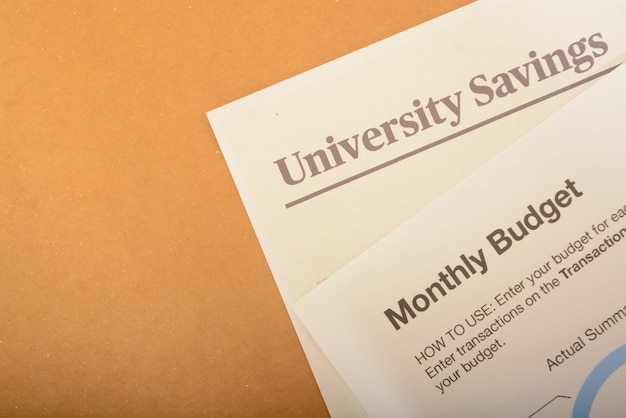How to Budget Financial Aid and Avoid Student Debt

Budgeting your financial aid wisely is crucial for avoiding student debt; prioritize needs, track spending, and explore cost-saving measures to manage funds effectively.
Navigating the world of financial aid can be overwhelming, but learning how to budget your financial aid money wisely and avoid student debt is an essential skill for any college student. By taking control of your finances early on, you can set yourself up for a more secure future, free from the burden of excessive debt.
Understanding Your Financial Aid Package
Before you can create a budget, it’s important to understand exactly what your financial aid package includes. This will give you a clear picture of the resources you have available and how they can be used. Understanding the specifics of each component can help you make informed decisions on how to allocate your funds effectively.
Types of Financial Aid
Financial aid comes in various forms, each with its own terms and conditions. Knowing the difference between them is crucial for responsible budgeting. Be sure to check the fine print of your award letter for any specific requirements or limitations that may apply.
- Grants: Grants are typically need-based and don’t have to be repaid. These are like free money for college, so make the most of them.
- Scholarships: Scholarships are awarded based on merit, talent, or specific criteria and also don’t require repayment. Look for scholarships that align with your interests or academic achievements.
- Loans: Loans are borrowed money that must be repaid with interest. Understand the interest rates and repayment terms before accepting loan offers.
- Work-Study: Work-study programs offer part-time jobs to students with financial need, providing an opportunity to earn money while attending school.
Reviewing Your Award Letter
Your financial aid award letter is the official document outlining the types and amounts of aid you’ve been offered. Review it carefully to understand the terms and conditions of each award. Note any deadlines for accepting or rejecting aid offers, and don’t hesitate to ask the financial aid office for clarification if anything is unclear.

In summary, understanding the different types of financial aid and carefully reviewing your award letter are the first steps toward effective budgeting. Take the time to educate yourself about your options and make informed decisions that align with your financial goals.
Creating a Realistic Budget
Once you know what financial aid you have, the next step is to create a realistic budget. A budget is simply a plan for how you’ll spend your money. Creating a budget involves estimating your income and expenses, and then making adjustments as needed to ensure you’re not overspending.
Estimating Income and Expenses
Start by estimating your income. This includes your financial aid, any earnings from work-study or part-time jobs, and any contributions from your family. Then, estimate your expenses. These can be divided into fixed expenses (like tuition, fees, and rent) and variable expenses (like food, entertainment, and textbooks).
Tracking Your Spending
Tracking your spending is essential for staying on budget. Use a budgeting app, spreadsheet, or even a notebook to record every expense. This will help you identify areas where you’re overspending and make adjustments as needed. One good method can be to log everything spent at the end of the day, every day.
Prioritizing Needs Over Wants
When creating your budget, it’s important to prioritize needs over wants. Needs are essential expenses like housing, food, and textbooks. Wants are non-essential expenses like entertainment, dining out, and new gadgets.
Keep discretionary expenses in check, and always consider whether a purchase is necessary or simply desirable.
Consider this:
- Cutting back on eating out
- Finding free entertainment options
- Buying used textbooks can significantly reduce spending
In conclusion, creating a realistic budget involves estimating your income and expenses, tracking spending, and prioritizing needs over wants. By taking these steps, you can gain control of your finances and avoid accumulating unnecessary debt.
Managing Tuition and Fees
Tuition and fees typically make up the largest portion of college expenses. Managing these costs effectively is crucial for avoiding student debt. There are several strategies you can use to minimize your tuition and fee expenses. Begin by understanding the tuition payment schedule and explore options for setting up a payment plan.
Payment Plans
Many colleges offer payment plans that allow you to spread your tuition payments over several months, rather than paying a large lump sum at the beginning of each semester. This can make tuition more manageable and help you avoid taking out additional loans.
Textbook Costs
Textbooks can be a significant expense, but there are ways to save money on these resources. Consider buying used textbooks, renting textbooks, or using e-books. You can find used textbooks at your college bookstore, online marketplaces, or from other students. Renting textbooks can be a more affordable option, especially for courses you only need the textbook for a short period of time. E-books are often cheaper than physical textbooks and can be accessed on your computer or e-reader.

Seeking Additional Aid
If your financial situation changes during the school year, or if you encounter unexpected expenses, don’t hesitate to seek additional aid. Contact your college’s financial aid office to discuss your options. You may be eligible for additional grants, scholarships, or loans.
By managing your tuition and fees wisely, you can minimize your overall college expenses and avoid accumulating unnecessary debt. Explore payment plans, seek additional aid if needed, and make informed decisions about how to allocate your financial aid funds effectively.
Saving on Housing and Living Expenses
Housing and living expenses can also be a significant part of your college budget. Finding ways to save on these expenses can free up funds for other needs. Exploring different housing options is the first step.
Living with Roommates
Living with roommates is a great way to save on housing costs. By sharing rent and utilities, you can significantly reduce your monthly expenses. However, it’s important to choose roommates carefully to ensure a harmonious living situation.
Cooking at Home
Eating out can be expensive, so cooking at home is a great way to save money on food. Plan your meals ahead of time, buy groceries in bulk, and cook in large batches to save time and money. Look for inexpensive and nutritious recipes online or in cookbooks.
Transportation Costs
Transportation costs can also add up, especially if you have a car on campus. Consider using public transportation, biking, or walking to save money on gas, parking, and maintenance. Many colleges offer discounts on public transportation for students.
- Carpooling.
- Reducing trips.
- Maintenance of vehicle.
In summary, finding ways to save on housing and living expenses is essential for effective budgeting. By living with roommates, cooking at home, and using alternative transportation, you can significantly reduce your monthly expenses and avoid accumulating unnecessary debt.
Avoiding Common Financial Pitfalls
Even with a well-planned budget, it’s easy to fall into common financial pitfalls. Identify and avoid these problems can help you stay on track with your financial goals. One common pitfall is credit card debt, so use credit cards responsibly and avoid carrying a balance.
Credit Card Debt
Credit cards can be useful for building credit and making purchases, but they can also lead to debt if not used carefully. Avoid charging more than you can afford to pay off each month, and always pay your bills on time to avoid late fees and interest charges. Consider using a debit card instead of a credit card to avoid overspending.
Impulse Purchases
Impulse purchases are unplanned purchases that you make on a whim. These can quickly derail your budget and lead to overspending. Avoid making impulse purchases by waiting 24 hours before buying anything you don’t need. This will give you time to consider whether the purchase is really necessary.
Overspending on Entertainment
Entertainment can be a major expense for college students, but there are ways to enjoy yourself without breaking the bank. Look for free or low-cost entertainment options, such as campus events, free concerts, or movie nights. Limit your spending on dining out, going to bars, or attending expensive concerts or sporting events.
In conclusion, avoiding common financial pitfalls is crucial for effective budgeting. By using credit cards responsibly, avoiding impulse purchases, and limiting your spending on entertainment, you can stay on track with your financial goals and avoid accumulating unnecessary debt.
Long-Term Financial Planning
Budgeting your financial aid wisely is not just about managing your finances in college; it’s also about setting yourself up for long-term financial success. Start planning early, consider your financial goals, and take steps to achieve them.
Building Credit
Building credit is important for accessing loans, renting an apartment, and getting a job after graduation. Start building credit by using a credit card responsibly and paying your bills on time. You can also become an authorized user on a parent’s or guardian’s credit card to build credit.
Investing for the Future
Even a small amount of money can grow over time through investing. Consider opening a Roth IRA or investing in a mutual fund to start building wealth for the future. Start by researching different investment options and consulting with a financial advisor.
Emergency Fund
An emergency fund is a savings account that you can use to cover unexpected expenses, such as medical bills, car repairs, or job loss. Aim to save at least three to six months’ worth of living expenses in your emergency fund. Start by setting aside a small amount of money each month and gradually increase your savings over time.
By taking a long-term view of your finances, you can set yourself up for a more secure future. Commit to saving a portion of your financial aid each semester to build an emergency fund or start investing for retirement. Stay informed about current trends and updates in the financial aid field so you can take advantage of all the resources available to you.
| Key Point | Brief Description |
|---|---|
| 💰 Understand Aid | Know the types of aid and review your award letter carefully. |
| 📝 Create Budget | Estimate income, track expenses, and prioritize needs over wants. |
| 💸 Manage Costs | Use payment plans, buy used books, seek extra aid if needed. |
| 🚫 Avoid Pitfalls | Limit credit card debt, impulse buys, and entertainment spending. |
Frequently Asked Questions
▼
If your aid falls short, explore additional scholarships, part-time work, or consider a less expensive housing option. Contact your financial aid office to discuss available options and resources.
▼
Utilize budgeting apps, spreadsheets, or even a simple notebook to record all your expenses. Regularly review your spending habits to identify areas where you can cut back and save more.
▼
Not necessarily. If managed responsibly, student loans can be a valuable tool for financing your education. Just be sure to understand the terms and repayment options before taking them out.
▼
Search online databases, check with your college’s financial aid office, and inquire with local organizations and community groups. Tailor your applications to match the specific requirements of each scholarship.
▼
Implement a cooling-off period before buying non-essential items. Wait 24-48 hours to evaluate whether the purchase is truly necessary or just a passing desire, reducing potential overspending.
Conclusion
Mastering the art of budgeting your financial aid can make all the difference in achieving your academic dreams without the burden of overwhelming debt. By adopting smart financial habits, prioritizing needs, and making informed choices, you can take control of your finances and set yourself up for a bright and financially secure future.





